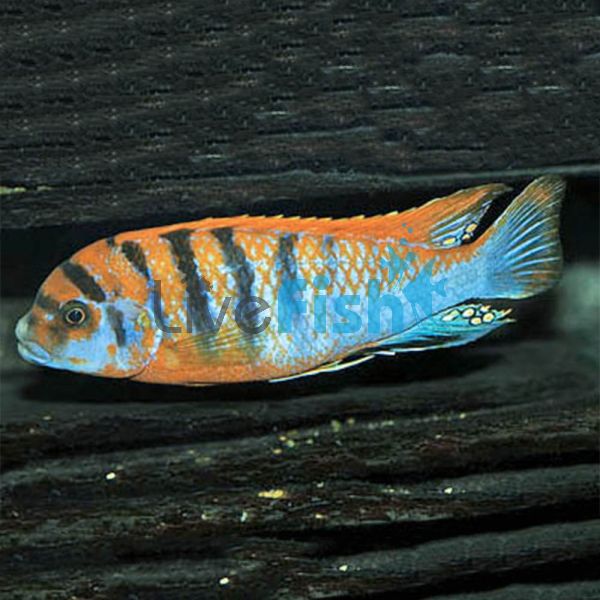Labidochromis Hongi 8cm
- Buy 2 for $44.16 each and save 10%
- Buy 4 for $41.71 each and save 15%
- Buy 8 for $39.26 each and save 20%
Labidochromis Hongi
The Labidochromis Hongi is a stunning and lesser-known mbuna species from Lake Malawi that has quickly become a favourite among African cichlid fans. Known for its electric blue body and bold orange dorsal fin, this fish delivers striking contrast and character to any Malawi biotope tank. Its compact size, manageable temperament, and vivid colouration make it an excellent choice for both seasoned hobbyists and newcomers to the African cichlid world.
The Hongi cichlid hails from the rocky shores of Likoma Island in Lake Malawi, where it can be found darting between crevices and defending small territories. In the aquarium, this species is always active, grazing on algae, exploring its environment, or displaying to tankmates. Mature males develop intense, iridescent blues across their body and face, with a glowing orange dorsal stripe that intensifies during breeding. Females and subdominant males are more muted, with lighter blues and less orange, but still striking in appearance.
Like many mbuna, Labidochromis Hongi are maternal mouthbrooders. Females will hold fertilised eggs in their mouths for about three weeks, releasing fully-formed fry once safe. Breeding them is fairly easy with the right conditions. A harem-style setup of one male to several females helps spread out attention and reduce harassment. Ensure plenty of rocky cover to allow each fish to establish their own space.
Tank Recommendations for your Labidochromis Hongi
An aquarium of at least 120 litres is suitable for a small group of Hongi cichlids, though larger tanks are always preferred. This species thrives in setups with abundant rockwork and hiding spots to break lines of sight and minimise conflict. A sand substrate and strong filtration will replicate their natural environment well. Keep the water hard and alkaline, ideally around 24-26°C and a pH of 7.8-8.6.
Suitable Tank Buddies
Labidochromis Hongi are semi-aggressive but more tolerant than many mbuna. They do well in mixed mbuna tanks with similarly sized and tempered species. Avoid keeping them with overly aggressive or much larger fish.
Usually Compatible
Yellow Labs, Red Zebras, Acei, Electric Blue Johanni, and peacocks of similar size.
Sometimes Compatible
Frontosa, Malawi dolphins, or peaceful haps. Only if size and aggression levels are monitored.
Rarely Compatible
Highly aggressive African cichlids like Dimidiochromis compressiceps or South American cichlids which prefer soft, acidic water.
Feeding your Labidochromis Hongi
Labidochromis Hongi cichlids are omnivorous grazers and will readily accept a wide variety of aquarium foods. A high-quality pellet with added spirulina or algae content is ideal. Supplement their diet with vegetable matter like zucchini slices, algae wafers, or spirulina flakes to support digestion and enhance colouration. Avoid high-protein, meaty diets as they may cause digestive issues over time.
| Scientific Name | Labidochromis sp. Hongi |
|---|---|
| Care Level | Moderate |
| Common Names | Hongi Cichlid, Hongi Mbuna |
| Diet | Omnivore |
| Fish Family | Cichlidae |
| Lifespan (years) | 10 |
| Max. Length (cm) | 10 |
| Min. Tank Volume (l) | 120 |
| Origin | Lake Malawi, Africa |
| Sociability | Semi-aggressive |
| Venomous | No |
| Water Conditions | 24-26° C, pH 7.0-8.5 |
| Plant Safe | No |




